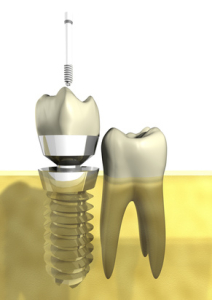How closely do tooth implants mimic a natural tooth?


After an oral surgeon places a dental implant, the surrounding bone at the implant site will fuse with the implant’s titanium surface. This process, osseointegration, renders the implant a permanent fixture in the mouth and gives it the root-like structure.
This similarity to a natural tooth offers many benefits to patients who choose a dental implant as a treatment option. First of all, the prosthetic is more stable because it has a physical connection to the jaw. This is particularly valuable when dental implants support a denture, which can be prone to slipping out of place with denture adhesive alone.
Additionally, when patients work with an oral surgeon to get this type of tooth replacement, the jaw remains more stable over time. The implant helps to hold the jaw in place, much in the same way that a natural tooth’s root does.
Greater jaw stability reduces the likelihood that the appliance will lose its fit over time. For example, a dental bridge may need to be replaced as the jawbone material wears away and changes shape.
Similarly, dental implants also help to preserve more chewing function in the aftermath of tooth loss. Because of their similarity to natural teeth, they can tolerate relatively significant chewing forces, meaning that most dental implant patients will need to eliminate few, if any, foods from their diets.
Of course, in order to gain all of the advantages of dental implants, it’s important for the patient to have enough bone to develop the bond with the implant. Your surgeon can advise you if you are a good candidate for this treatment.
Patients who want a structurally complete tooth replacement that approximates a biological tooth should explore dental implants as an option. One of our talented specialists at Central Oklahoma Oral & Maxillofacial Surgery Associates can give you more information on this intervention and inform you if it’s a good choice in your case. Call 405-624-1300 today to schedule your visit.